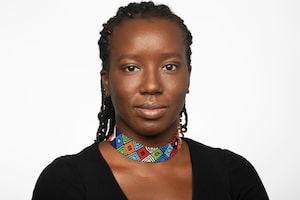Vicky Mochama is a contributing columnist for The Globe and Mail.
In my mind, the mayor of New York City is and always will be Michael Bloomberg, a squirrelly anti-Black cartoon multimillionaire. (I almost envy people for whom that role is played by the bombastic and wayward Rudy Giuliani, whose position as one of the legal geniuses behind Donald Trump must surely tickle.)
I mention all of this because I was surprised to learn, in no less a source than the New York Times, that at some point while I wasn’t paying attention to America’s permacrisis, there had been a New York City mayor named Bill de Blasio.
Once I got over that shock, I read on: Mr. de Blasio and his wife Chirlane McCray were announcing a separation.
Maybe only the streaming company algorithms know what the couple was watching on that “stale Saturday night” of binge-watching TV that reportedly sparked the offhand question by Mr. De Blasio – “Why aren’t you lovey-dovey any more?” – that led to their split, and an article in the Times.
(Personally, I’m all for more articles of the same variety. Ever on the lookout for my next journalism gig, I noticed that the Times recently put out a job listing for a wedding reporter. Surely there’s room in the budget for a Conscious Uncoupling columnist? )
As part of their separation, Mr. de Blasio and Ms. McCray will continue to share the family townhouse. Which brings me to the most compelling part of their announcement: they plan to date other people.
Single-adjacent and ready to mingle? How novel.
Usually when still-legally-married public figures date, we find out well after the fact, and the words “sex scandal” go on to somehow lose all of their built-in shimmer. So I’m inclined to toast joyous congratulations to this pair who may be at the precipice of a journey shared by millions of people: an experience of relationships that allows for love connections beyond a one-on-one dyad.
Bravely, I think, they’ve thrown open doors – and, for once in a political man’s life, without the need to prove character bona fides as a Family Man™, an often gossamer-thin image proven false by the fact that he chose to put his family through the wringer – to an honest discussion around ethical non-monogamy among consenting couples.
U.S. data from 2014 revealed that somewhere between four and five per cent of Americans are in such consensual, non-monogamous relationships. Data from a 2019 UBC study found that of 2,003 Canadian adults surveyed, 2.4 per cent had been in an open relationship; of those currently in any relationship, four per cent were in open ones. By small margins, this relationship dynamic was more likely among people under the age of 40, and was more desirable for men. The results also showed that 12 per cent said that their ideal relationship was open – meaning more Canadians want open relationships than are actually involved in one.
One of the researchers, who also privately counsels people in non-monogamous relationships, told the Toronto Star that anecdotally, many people are worried that talking about their experience of non-monogamy would be “akin to throwing a hand grenade into the middle of the breakfast table.” This is a consequence of a political culture that is insistent on (if inconsistent with) the variety and depths of one’s rights and freedoms while also insisting on (and legislating) restrictive views of monogamy and sexuality. Pushing back at this is a constellation of organizations, ranging from sex clubs to LGBTQ-rights groups, that are celebrating a day of visibility for non-monogamy on July 15, organizing picnics and events across North America.
There’s a lot of pressure on the invisible string that ties a couple together. Like the metal locks that hang on a sighing European bridge, coupled monogamy can bring a great deal of joy – a reminder that we humans have such an admirable desire to declare our love – but it can also be a heavy burden. Not all relationships can bear the weight; some collapse.
There’s another practical reason to welcome consensual non-monogamy. It would recognize a lurking reality: that, as journalist Jean Hannah Edelstein wrote when three Brazilians were legally married in 2012, “plenty of marriages have three people in them. They’re just not legal ones.”
Conversely: I’ve heard so many straight married men say “wife,” yet in tone and deed, the word sounds suspiciously like “hostage.”
So what if instead, we allowed ourselves a more expansive idea of love that isn’t solely about monogamous state recognition? Instead, love could be about the many kinds of invisible strings we attach to each other, opening up room for genuine conversations about friendship and family and obligation and devotion and care (not to mention joy and pleasure) that are sorely needed – even in relationships that aren’t as rarified as that of a former first couple of New York.
 Vicky Mochama
Vicky Mochama